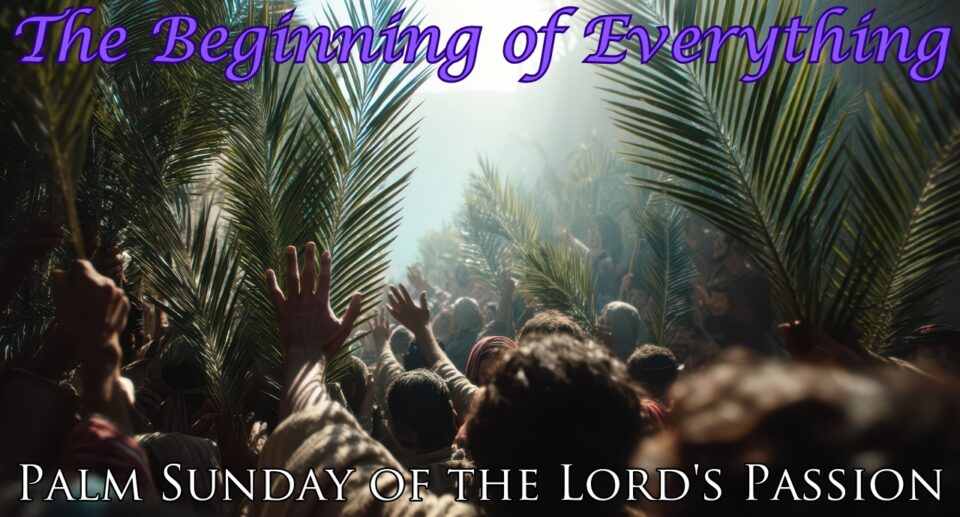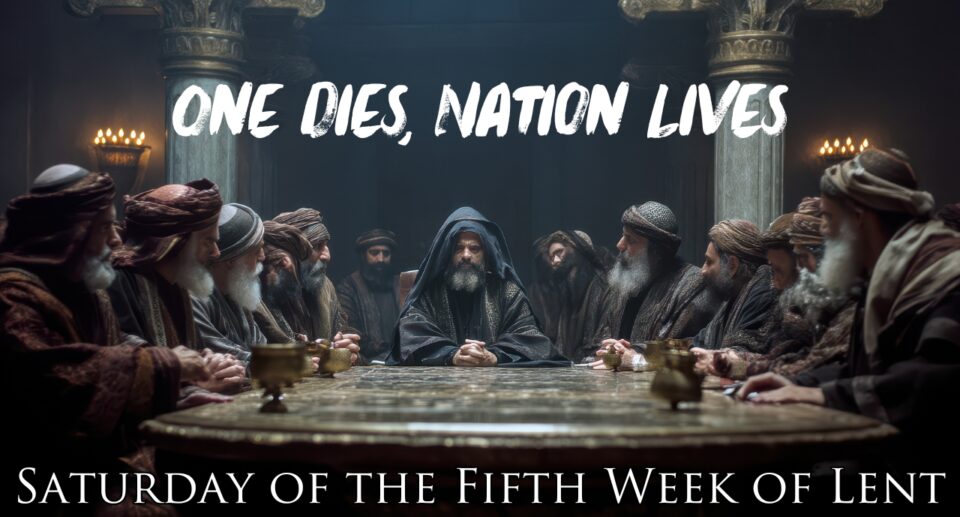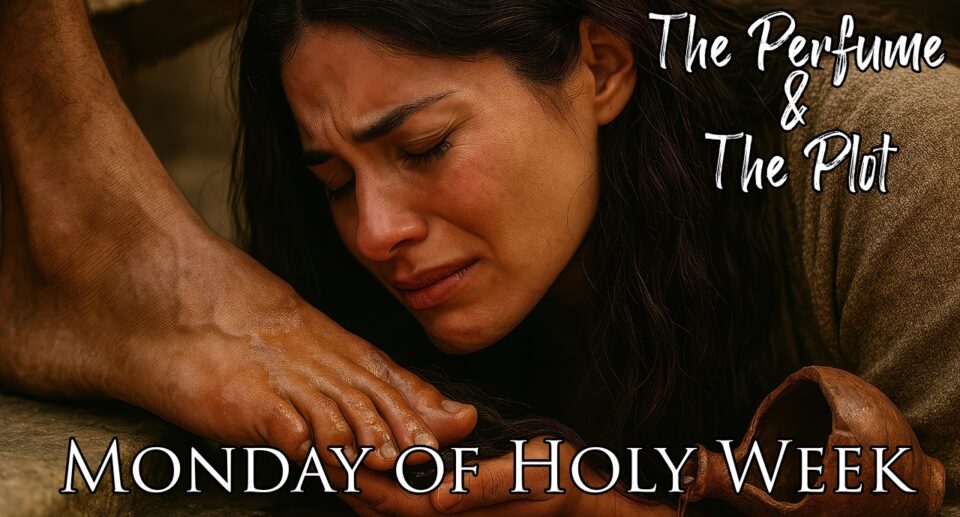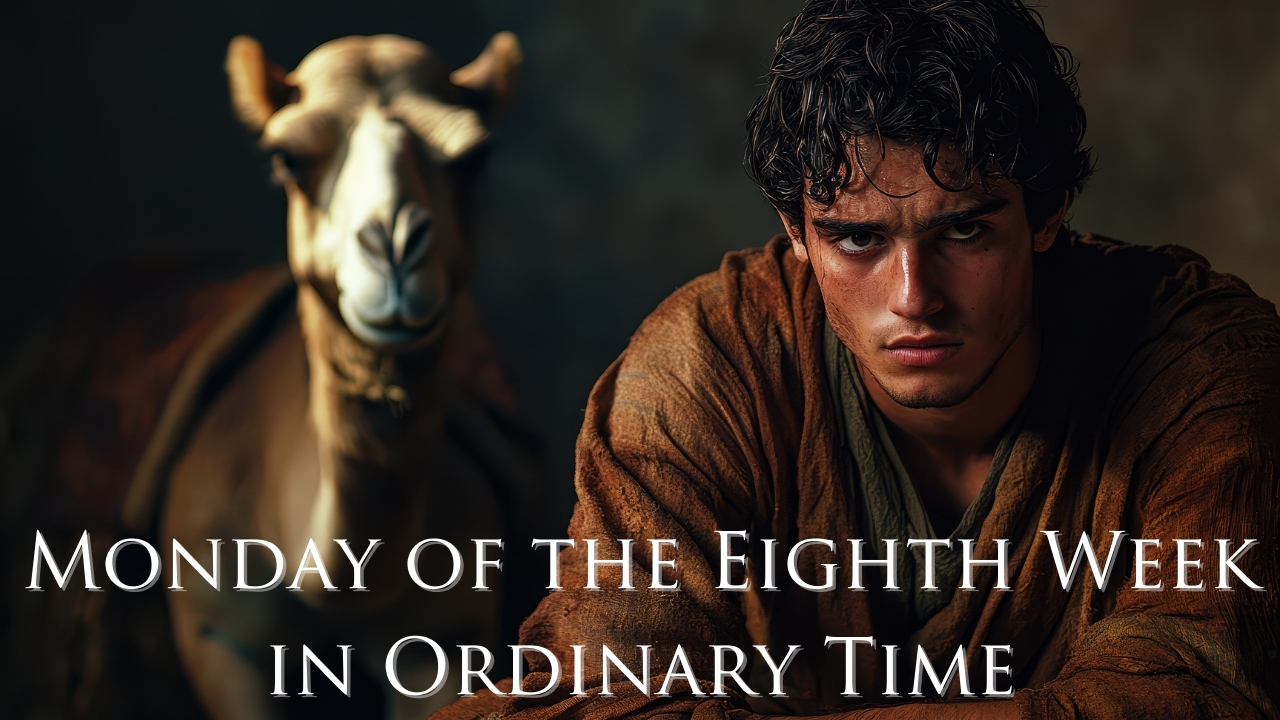From Hosanna to Crucify: The King Who Bends Low | Palm Sunday | Daily Readings | April 13, 2025

In a single liturgy, we journey from triumph to tragedy, from Hosanna to Crucify Him. Today’s powerful Palm Sunday reflection explores the stunning paradox at the heart of Holy Week—a king who conquers through surrender and reigns from a cross.
Through this reflection, you’ll discover:
- Why Jesus deliberately chose a donkey rather than a warhorse for his royal entry
- How the Suffering Servant passages illuminate Christ’s revolutionary kingship
- What Psalm 22’s movement from abandonment to praise reveals about our own suffering
- How Christ’s self-emptying transforms our understanding of true power
Readings covered: Luke 19:28-40; Isaiah 50:4-7; Psalm 22:8-24; Philippians 2:6-11; Luke 22:14—23:56
Perfect for anyone seeking deeper meaning in Holy Week, struggling with suffering or apparent defeat, or wanting to understand how Christ’s passion speaks to our contemporary world.
#PalmSunday #HolyWeek #PassionSunday #ChristsKingship #DivineParadox #SufferingServant #LentenJourney
From Hosanna to Crucify: The King Who Bends Low
The crowd’s roar swelled as the man approached Jerusalem. Cloaks thrown across the dirt road formed a makeshift royal carpet. Palm branches waved, creating a rippling green sea. Children pushed forward for a glimpse. “Hosanna!” they cried. “Blessed is the king who comes in the name of the Lord!”
Yet something was wrong with this triumphal entry. No warhorse carried this king, no glittering armor adorned him, no army marched behind him. Just a borrowed colt, the clothes on his back, and a ragtag group of followers. The Pharisees sensed the dangerous dissonance. “Teacher,” they hissed, “rebuke your disciples!”
Jesus looked at the stones beneath the donkey’s hooves, then back at his critics. “I tell you,” he replied, “if they keep silent, the stones will cry out.”
Five days later, those same streets would echo with different cries: “Crucify him! Crucify him!” The king who rode in on a donkey would hang on a cross. The back that bore only a simple cloak would be stripped and lashed. The hands that blessed children would be pierced with nails.
Today we stand at the threshold of Holy Week, holding palm branches while glimpsing the shadow of the cross. In a single liturgy, we move from triumph to tragedy, from “Hosanna” to “Crucify him.” This jarring juxtaposition isn’t liturgical convenience—it’s the heart of the gospel’s paradox: true kingship revealed through apparent defeat, divine power manifested in radical vulnerability.
Our readings today take us on this journey of paradox. In the Procession Gospel, Luke shows us Jesus orchestrating his entry into Jerusalem with deliberate symbolism. He specifically requests a colt “that no one has ever sat upon”—an animal fit for royal or sacred use. He allows the crowds to acclaim him with messianic language drawn directly from Israel’s royal traditions. Jesus isn’t accidentally caught in events beyond his control; he’s intentionally fulfilling ancient prophecies about how Israel’s true king would come—humble, riding on a donkey.
Yet within days, this proclaimed king stands before Pilate, beaten and condemned. How does such a stunning reversal happen?
Isaiah’s Suffering Servant passage offers our first insight. “The Lord GOD has given me a well-trained tongue, that I might know how to speak to the weary a word that will rouse them,” the servant says. This king comes not with military declarations but with words that awaken the exhausted and hopeless.
But such words often provoke resistance: “I gave my back to those who beat me, my cheeks to those who plucked my beard; my face I did not shield from buffets and spitting.”
Here is kingship redefined—authority exercised not through domination but through vulnerable solidarity with the suffering. The servant’s power lies not in avoiding pain but in facing it with unflinching resolve: “I have set my face like flint, knowing that I shall not be put to shame.”
This flint-faced determination carries Jesus from triumphant entry to upper room to garden to cross. It’s not fatalism or passive acceptance, but active, costly love chosen with clear-eyed purpose.
Our responsorial psalm intensifies this paradox. Psalm 22 begins with words Jesus will cry from the cross: “My God, my God, why have you abandoned me?” It unfolds as a landscape of humiliation—mockery, physical agony, public shame. “All who see me scoff at me… They divide my garments among them, and for my vesture they cast lots.”
Yet midway through, this same psalm pivots to confidence and praise: “I will proclaim your name to my brethren; in the midst of the assembly I will praise you.” Abandonment becomes the very context for divine faithfulness. Suffering becomes the stage for God’s saving action.
Then Paul’s Christ-hymn in Philippians reveals the theological heart of this paradox: Jesus, “though he was in the form of God… emptied himself, taking the form of a slave, coming in human likeness… he humbled himself, becoming obedient to death, even death on a cross.”
This is the great downward movement of God—from highest height to lowest depth, from divine glory to human shame, from eternal life to brutal death. But this descent becomes the very basis for his exaltation: “Because of this, God greatly exalted him.”
In Christ, we discover a revolution in our understanding of power. True sovereignty comes not through grasping but through giving, not through being served but through serving, not through avoiding suffering but through transforming it from within.
Luke’s Passion narrative brings this paradox to its culmination. The king rides into Jerusalem on a donkey, then kneels to wash feet. The miracle-worker is bound and beaten. The one who raised others from death suffers its agonies himself.
Yet throughout, Jesus remains sovereign in surrender. Even as soldiers nail him to the cross, he exercises his kingship through forgiveness: “Father, forgive them, they know not what they do.” Even as life ebbs away, he extends his reign: “Today you will be with me in Paradise.” Even at the moment of deepest abandonment, he offers a final act of trust: “Father, into your hands I commend my spirit.”
What does this paradoxical kingship mean for us today?
First, it challenges our understanding of power. In a world that equates authority with domination, success with wealth, and winning with crushing opponents, Jesus reveals divine power flowing through self-giving love. The palms and the cross together remind us that true strength often looks like weakness to the world’s eyes.
Second, it confronts our fear of vulnerability. How much energy do we expend avoiding pain, protecting our image, and maintaining control? Jesus shows us that transformation happens not through avoiding suffering but through entering it with purpose and trust. The servant’s “flint face” isn’t stoic detachment but resolute love that refuses to be deterred by the cost.
Third, it offers hope amid apparent defeat. The journey from palms to cross doesn’t end in death but resurrection. The crowd’s “Crucify him!” is answered by Easter’s “He is risen!” Divine faithfulness operates in a longer arc than our immediate circumstances suggest. As Psalm 22 moves from abandonment to praise, our own experiences of desolation can become doorways to deeper communion.
As we enter Holy Week, we’re invited to walk this paradoxical path with Jesus. To lay down our cloaks, our pretenses, our self-protection, and allow this humble king to enter the Jerusalem of our hearts. To sit at the table where he transforms betrayal into communion. To watch in the garden as he chooses costly love over safety. To stand at the cross where apparent defeat reveals God’s heart.
This king rides no warhorse but breaks the power of violence through absorbed suffering. He wears no crown except thorns yet reigns over death itself. He commands no army but conquers through forgiveness rather than force.
There is no sanitized way to follow this king. We cannot keep the palms and skip the cross. We cannot claim the exaltation without embracing the emptying. We cannot experience resurrection without dying to our old understandings of power, success, and security.
But if we dare to follow this paradoxical path—if we allow our hosannas to be purified through the crucible of Holy Week—we will discover what true kingship looks like. We will experience the liberation that comes not from grasping power but from receiving it as gift. We will find ourselves joining creation’s unending praise of the One who demonstrates that the truest authority is love that bends low to lift others high.
The stones themselves bear witness. Through the seemingly immovable structures of sin, death, and oppression, God’s new creation breaks forth. May our hearts be less resistant than stone, more open to the transforming paradox of the king who comes humble, mounted on a colt, arms stretched wide on the cross to embrace a world he will not dominate but will die to save.






